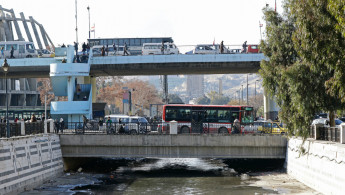Water from Wadi Barada to the Syrian capital was cut on 22 December restricting access to mains water for millions of local residents amid mutual accusations from regime and rebel groups over who was responsible.
Confusion over 'ceasefire agreement' in contested Wadi Barada
Hezbollah-affiliated media reported on Friday evening that a temporary ceasefire between rebel groups and pro-regime forces has been concluded in the contested Wadi Barada region located close to Damascus.
According to Al-Manar TV station all rebel groups in the valley, which provides Damascus’ main source of water, are included in the deal which is said to cover 11 towns and villages in the area.
Other sources, such as al-Hadath News - which cited a civilian source in the area - said the ceasefire came into place at 18:00 local time and is set to last three hours.
However, in comments to Reuters a senior rebel official from the political wing of Ahrar al-Sham denied that any ceasefire agreement had taken place amid growing confusion over the terms of the apparent deal.
Meanwhile, despite the existence of a Russia-Turkey brokered nationwide truce for Syria that came into place in late December, assaults on the besieged villages of Wadi Barada involving both personnel from the Syrian Arab Army and Hezbollah have remained ongoing.
In the past two weeks monitoring groups have recorded a rising death toll in the area where an estimated 100,000 people are said to be trapped.
Speaking to The New Arab on Friday morning both the UN and the Red Cross said that they were seeking access to Wadi Barada but were unable to move into the area due to the continuation of fighting.
The Lebanese Shia paramilitary group Hezbollah, with Iranian backing, is reluctant to leave the area, located between Damascus and its strongholds in the Bekaa valley across the Lebanese border.
Reports emerged earlier this week that Hezbollah officials had denied Russian personnel access to Wadi Barada to assess the situation in the valley in the face of growing criticism of their military operations in the area.





 Follow the Middle East's top stories in English at The New Arab on Google News
Follow the Middle East's top stories in English at The New Arab on Google News


